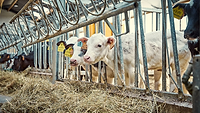MSU Finds Dairy Producers Overuse Antibiotics When Treating Cows for Mastitis

Image credit: Daniel Sinoca via Unsplash
New research from the College of Veterinary Medicine at Michigan State University (MSU) finds that dairy producers overtreat cows diagnosed with non-severe cases of clinical mastitis, which is a possible threat to human health. The study was supported by a U.S. Department of Agriculture National Institute of Food and Agriculture (USDA NIFA) Food Safety Challenge Grant.
In dairy cows, mastitis is the inflammation of mammary glands in the udder, usually caused by a bacterial infection that leads to decreased quantity and quality of milk.
MSU researchers reviewed non-severe cases of clinical mastitis for approximately 50,000 cows on 37 commercial dairy farms in Wisconsin. Overall, the findings suggest that for routine treatments, following the minimum labelled duration for mastitis treatment drugs is critical to maintaining animal and human health.
The study indicates the need to reexamine the duration of treatment for mastitis in dairy cows. Unless improved clinical outcomes can be justified, cows should be treated using the minimum duration listed on product labels, and for shorter durations. This would benefit human health benefit by releasing fewer antimicrobials into ecosystems, therefore reducing the risk of antimicrobial resistance (AMR).
There are five existing products labeled to treat clinical mastitis in the U.S. The U.S. Food and Drug Administration (FDA) -approved labeled duration of treatment with the five drugs ranges from one day to up to eight days. People typically treat for five days because that is the average time the milk remains visually abnormal, and dairy farmers feel like they should treat until it looks like the mastitis is cured. However, previous MSU studies have shown that abnormal milk appearance is from inflammation, and it is not predictive of outcomes like the presence of bacteria or infection recurrence.
Looking for a reprint of this article?
From high-res PDFs to custom plaques, order your copy today!






